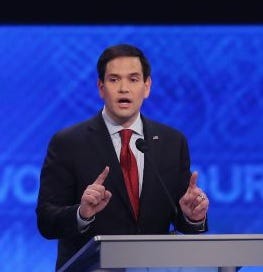Anyone who has watched a majority of the GOP presidential debates can tell you that message repetition is a big part of the candidates' selling points. Front-runner Donald Trump often speaks in platitudes that include building a wall, China, winning, and Making America Great Again. Ted Cruz has recited his line about repealing "every word of Obamacare" countless times. John Kasich often answers questions by invoking his record in Ohio. And Chris Christie, of course, has talked about being a federal prosecutor on 9/11 ad nauseam.
For better or for worse, most candidates use repetitive talking points, and it typically makes sense to do so. You never know, after all, if your audience is comprised of voters who may be closely paying attention to your case for the presidency for the very first time.
One candidate who hadn't struck me as being particularly repetitive (other than when it came to the inspiring story of his upbringing) was Marco Rubio. That of course changed last Saturday night, at the ABC debate, when he pivoted multiple times (while being heckled by opponent Chris Christie) to an obviously rehearsed line about Barack Obama's failures stemming from the president's ideology rather than his inexperience.
Rubio's intent was to address criticism of his own lack of governing experience by emphasizing his personal judgement and knowledge of the issues over his resume. His delivery, unfortunately for him, was atrocious and strikingly uncharacteristic of his typically nimble-minded demeanor. The result was Rubio playing directly into Christie's narrative that U.S. senators don't have the necessary skill-set that state governors have to lead the nation.
Even though the rest of Rubio's debate performance that night was actually very good (especially in the realm of foreign policy knowledge), I knew his slip-up would be a compelling news item afterwards. I had no idea, however, just how compelling of a news item it would be.
ABC News pundits pounced on the incident the moment the debate ended, framing it as a devastating blow to the senator. "Rubio Chokes" read a headline in the Politico. The Boston Herald went with "Under fire, Marco Rubio crashes and burns". It was the lead debate story on all of the national news networks for the next 24 hours, with some pundits even referring to Rubio's conduct as a "meltdown." Others likened it to a malfunctioning robot. There was even speculation that Rubio's candidacy might have been permanently derailed.
The media's coverage of the Rubio incident was (and continues to be) weirdly obsessive — especially considering that the substance of what he was saying wasn't particularly controversial. And I'm not the only one who has noticed the oddity.
Renowned statistician Nate Silver, who has made a name for himself in recent years for nailing his predictions of high-profile election outcomes, tweeted that night: "I thought Rubio had a real bad night too but given the media groupthink on the issue I'm rapidly becoming less certain."
It was a good observation by Silver, one that he has qualified in other tweets over the past couple of days.
While it's undeniable that Rubio screwed up that night, the national media pile-on that ensued went far beyond a proportionate response to a newsworthy rhetorical misstep. The media was as thirsty for Rubio's blood as Chris Christie was, and they made certain that an exchange that lasted probably less than three minutes in total defined his performance that night as nothing less than a political catastrophe.
Part of the explanation likely comes from the matter that Rubio doesn't make many mistakes while campaigning. He typically presents himself intelligently and eloquently, and holds up well in back-and-forth arguments (as Ted Cruz would probably agree). Thus, the surprise factor was probably a contributor.
My guess is that the larger ingredient, as Silver eluded to, has more to do with the fact that many polls show Rubio as the GOP's best chance of beating the Democratic candidate in November. Because of that, his bar for failure has been set quite low. And it's been positioned there by the same profession that set a very low bar for success, eight years ago, when it came to another first-term senator who was vying for the White House.
This level of scrutiny really isn't all that inconsistent with the journalists and news organizations who believed Rubio's boat purchase, and having earned four traffic tickets over the past 20 years, were hot-ticket news items.
Was Rubio's mistake at Saturday's debate worthy of news coverage? Absolutely. But had it been Hillary Clinton, Bernie Sanders, or even a GOP candidate who polls poorly in general election match-ups, I don't think it would have gotten a quarter of the press.
When it comes to a GOP candidate that threatens the power of the Democratic Party, the media is always prepared to make a mountain. Unfortunately, on Saturday, Marco Rubio gave them their molehill.



